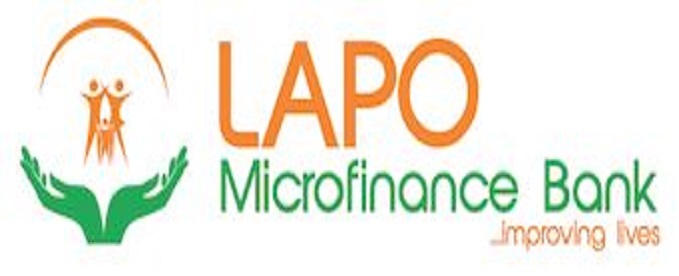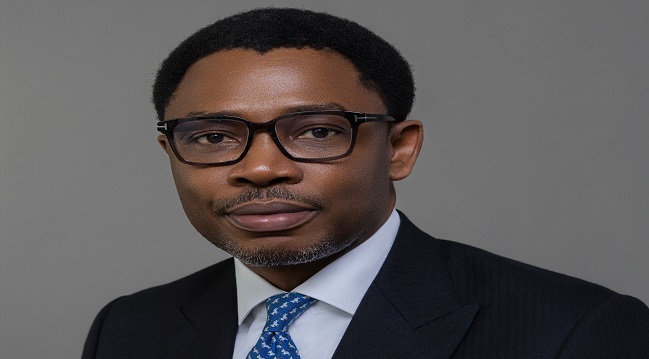E-Financial
LAPO Navigates Microfinance through COVID-19

By Edward P. Eze
Microfinance Institutions (MFIs) provide the best access to banking services for the majority of such underprivileged populations whose livelihoods have been worst affected by the pandemic’s disruptions to transportation, customer service, supply etc.

Because these populations generally save little and rely on daily basic income, they are now in greater need of sustainable credit and other pro-poor services that were already provided for them by microfinance institutions before the pandemic hit.
For a country like Nigeria experiencing mass poverty, steep unemployment and other serious socio-economic challenges, the implications are dire.
It means that millions of poor citizens amongst the 40 percent of the population will find it difficult to get back on their feet without the sort of services and support that MFIs provide. It goes without saying that the effectiveness of Nigeria’s MFIs will be critical to rebuilding the economy.
One of the major players in Nigeria’s Microfinance sector is LAPO Microfinance Bank which has an extensive network of branches across the country and accounts for over 27 percent of the Microfinance (MFB) sector.
LAPO MFB’s ubiquitous presence across the country as well as its pro-poor and solid corporate reputation established over nearly four decades have made it the country’s preeminent MFB.
In fact, due to its popularity many Nigerians in the lower socio-economic groups use ‘LAPO’ as a generic name for all microfinance banks, the same way “Omo” has become a synonym for detergents and “Bournvita” used to be for cocoa beverages.
LAPO MFB has approached the challenges of the pandemic with its trademark rigour and thoroughness.
It has made significant strides amidst the historic disruptions brought on by the pandemic whiche emerged in the country just over a year ago.
It has sustained its support to low-income earners, even recording a total disbursement of N12.2 billion as loans to 152,446 rural farmers and owners of Small and Medium Scale Enterprises (SMEs) in 2020.
Announcing these milestones recently, Dr Honestus Obadiora, LAPO’s Acting Executive Director, said the loans were disbursed in 253 branches across 21 states. “We were able to achieve this in spite of the pandemic and we are committed to sustaining this financial support through our development plan to open more branches and reach more clients,” Obadiora said.
The N12.2 billion disbursement represents a 12 percent increase compared to N10.9 billion disbursed in 2019 with portfolio at risk standing at 18.62 percent.
LAPO MFB has recorded other notable achievements during the pandemic including the launch in February, 2020 of its second bond, a N6 billion fixed rate bond which within five months was already oversubscribed by N200m.
However, even with such stellar achievements, LAPO like other MFIs is weathering significant challenges due to the pandemic.
A survey by the Consultative Group to Assist the Poor (CGAP), a global partnership of more than 30 leading development organizations that works to advance the lives of poor people through financial inclusion, shows that microfinance institutions (MFIs) are dealing with rising ‘bad debts,’ which now account for up to 30% of their total loans.
The survey, conducted with the SME Forum, also shows that there is now a higher rate of defaults in loan repayments because of widespread business failures and even outright closures due to the pandemic.
This is a major issue because most MFIs operate with little savings, expecting that small loans will be repaid in a timely fashion and with a low default rate. The fallout of increasing defaults due to the pandemic is that MFIs in turn face challenges repaying banks and their investors.
As a result, the network of trust that is so vital to MFIs is threatened as investors are becoming more cautious about which MFIs they lend money to.
However, reports say majority of MFIs remain reasonably sound financially and widespread bankruptcies are not expected at this time. In the case of LAPO, positive developments such as the enthusiastic response to the recent launch of its bond signal bright prospects for its long-term health.
It is also noteworthy that the pandemic disrupted business operations of many MFIs considerably.
Like its counterparts, LAPO has had to alter physical and onsite operations especially at the start of the pandemic.
The bank demonstrated commendable foresight by closing down its on-site operations across Nigeria on Wednesday, March 25, 2020, ahead of the Government’s lockdown directives for Lagos, Ogun and the Federal Capital Territory.
proactive measure to ensure the safety of customers and staff is in line with LAPO’s well-known reputation for championing public health through investment and public enlightenment.
Interestingly, in a seeming foreshadowing of the pandemic a few months before it began, LAPO played an active role in promoting hygiene through hand washing on World Hand-washing Day, October 15, 2019.
The organization donated items to schools to create awareness about the importance of hand-washing which would turn out to be essential in the fight against Covid-19.
While the pandemic persists, MFIs continue to face challenges meeting physically, communicating, and collecting loan repayments from their clients. International industry experts believe that now more than ever, the value of digital financial channels such as agent networks, e-wallets and mobile banking are vital because these technologies allow for continuity of service and spare customers the risk and inconvenience of travelling to branches as well as protect staff of the MFIs.
LAPO is in a good position to embrace such recommendations to further digitize operations because of its already existing culture of technological innovation.
For instance, in February 2020, LAPO announced plans to implement Oracle’s Flexcube, a budding automated banking software that already powers more than 10 percent of the world’s consumer bank accounts.
The preeminent microfinance bank appreciates that effective digitization must take into account the reality that majority of customers don’t have reliable access to technology.
This is a key component of the conscientiousness required as MFIs navigate the realities of the pandemic and continue to support the poorest segments of the population.
Finally, robust policy support by government is required to assist MFIs maintain asset quality so that they can continue to give out new loans to low-income households or MSMEs as an empowerment and poverty fighting measure.
It is therefore critical for policy makers to make necessary adjustment to extant laws and regulations to achieve this vital objective in order to stave off deepening inequality and poverty to give those at the bottom of the ladder a life line at this very challenging time for the local and global economies.
*Eze is a policy analyst based in Lagos.
E-Financial
EFCC Seeks Suspension, Prosecution of Banks for Aiding N162Bn Crypto Scams

Economic and Financial Crimes Commission (EFCC) has called for the suspension and prosecution of deposit banks, Fintechs and microfinance banks aiding and abetting fraudsters in defrauding Nigerians through fraudulent schemes.

Wilson Uwujaren, director of Public Affairs of the Commission, made the call in Abuja, on the sidelines of a recent news briefing about negligence and compromise of the financial institutions that cost victims billions of naira.
Uwujaren said that the commission uncovered widespread compromise within Nigeria’s financial system, involving an N18.7 billion investment scam and fraudulent transactions of N162 billion in cryptocurrencies.
He accused one new-generation bank, six Fintechs and some microfinance banks of aiding and abetting fraudsters in laundering their proceeds.
“It is worrisome that investigations by the commission showed that cryptocurrency transactions to the tune of N162 billion passed through a new generation bank without any due diligence.
“Investigations also showed that a single customer maintained 960 accounts in the new generation bank, and all the accounts were used for fraudulent purposes.”
He said that the financial institutions clearly compromised banking procedures and allowed the fraudsters to safely change their ill-gotten gains into digital assets and move them to safe destinations.
“The Commission is calling on regulatory bodies to bring financial institutions to compulsory compliance with regulations in the areas of Know Your Customers (KYC), Customer Due Diligence (CDD), Suspicious Transaction Reports (STRs) and others.
“Deposit money banks, Fintechs and microfinance banks found to be aiding and abetting fraudsters should be suspended and referred to the EFCC for thorough investigation and possible prosecution,” he said.
He said that the scams of N18.7 billion were in two categories, adding that the first was a syndicate of fraudsters that employed an airline discount scheme to lure their victims.
The second one, according to him, involved a company named Fred and Farid Investment Limited, simply called FF Investment, which lured Nigerians into a bogus investment arrangement.
“The modality of the fraudsters in the airline scam involved a string of carefully devised airline discount information that any unsuspecting foreign traveller will fall for.
“What they do is to advertise a discount system in the purchase of flight tickets of a particular foreign carrier.
“The payment module is designed in such a way that their victims would be convinced that the payment is actually made into the account of the airline.
“No sooner is the payment made than the passenger’s entire funds in his bank account are emptied.”
He said that over 700 victims had fallen into the trap of fraudsters through the scheme with a total loss of N651.1 million.
Uwujaren said that the commission succeeded in recovering and returning N33.63 million to victims of the scam and cautioned Nigerians to be more vigilant.
The second scheme, according to him, involved a company named Fred and Farid Investment Limited, simply called FF Investment, which lured Nigerians into bogus investment arrangements.
“More than 200,000 victims have been defrauded in this regard. A total sum of N18.1 billion was raked in through nine companies offering diverse investment packages.”
Uwujaren said that foreign nationals are behind the schemes, with three Nigerian accomplices who have been arrested and charged in court.
E-Financial
Fitch Downgrades Afreximbank to ‘BB+’/Stable Amid Concerns Over Ghana’s Debt

Fitch Ratings has downgraded African Export-Import Bank’s (Afreximbank) Long-Term Issuer Default Rating (IDR) to ‘BB+’ from ‘BBB-’.

Fitch also downgraded Afreximbank’s Short-Term IDR to ‘B’, from ‘F3’, and the long-term ratings on the bank’s global medium-term note programme and debt issuance to ‘BB+’, from ‘BBB-’.
The global rating institution subsequently withdrew the bank’s ratings.
In a statement posted on its website, Fitch explained that the downgrade “reflects our revision of Afreximbank’s policy importance risk to ‘medium’ from ‘low’ following the announcement of an agreement on Ghana’s debt to Afreximbank in the context of Ghana’s broader restructuring”.
It said, “This has led us to revise our assessment of Afreximbank’s business profile to ‘high risk’ from ‘medium risk’, which resulted in an overall business environment notching of -3 (-2 previously).”
Essentially, a BB+ /Stable rating from Fitch is considered non-investment grade, also known as high-yield or “junk”.
The statement added, “Fitch has chosen to withdraw the ratings for commercial reasons. Fitch will no longer provide ratings or analytical coverage for the bank.”
In arriving at its decision, Fitch stated, “Afreximbank and Ghana announced in December 2025 that they had reached an agreement in principle with respect to Afreximbank’s $750 million sovereign loan to Ghana.
“The IMF stated that the deal is in line with the comparability of treatment under Ghana’s official creditor committee. We view this as evidence that Afreximbank did not benefit from its preferred creditor status (PCS).”
It said, “While we had not previously given any uplift in our solvency assessment for PCS, the de-facto preferential treatment in a broader sense that Afreximbank, along with most other multilateral development banks, benefit from was previously factored into our assessment of the bank’s policy importance.
“The bank’s inclusion in Ghana’s restructuring underlines its weakening policy importance, in our view.”
The rating institution also said, “Our latest assessment of Afreximbank’s ‘high’ business profile risk underpins the ‘high risk’ quality of governance assessment, and ‘high’ strategy risk.
“The ‘high risk’ business environment assessment reflects the bank’s exposure to a ‘high risk’ operating environment with weak credit quality, low income per capita and high political risk in the countries of operation.”
It explained that the ratings were driven by the bank’s Standalone Credit Profile (SCP) of ‘bb+’, reflecting the lower of the solvency (bbb+) and liquidity (a) assessments and its ‘high risk’ business environment.
The statement added that the solvency assessment balanced the bank’s ‘strong’ capitalisation and ‘moderate’ risk profile.
Fitch stated, “Afreximbank’s ‘bbb+’ solvency assessment reflects both ‘strong’ capitalisation and ‘moderate’ solvency risks. Our assessment of capitalisation is underpinned by a ‘moderate’ usable capital to risk-weighted assets (21 per cent at end-2024) ratio, a ‘strong’ equity to assets and guarantees ratio (19 per cent) and ‘excellent’ internal capital generation.
“The ‘moderate’ solvency risks assessment reflects ‘high’ credit risk, ‘weak’ risk management policies, ‘low’ concentration risk and ‘very low’ equity risk.
“Afreximbank’s ‘a’ liquidity assessment reflects the ‘strong’ quality of treasury assets, measured by the share of treasury assets rated ‘AA-’ to ‘AAA’ (50 per cent at end-2024 and we expect it to remain above the ‘strong’ threshold of 40 per cent), and a ‘moderate’ liquidity buffer (defined as liquid assets-to-short-term debt, at 95 per cent at end-2024).
“The bank’s liquidity profile is enhanced by its access to capital markets and diversified funding sources, including credit lines ($2.1 billion, of which $0.6 billion was committed at end-2024) and collateral deposits. The short duration of the loan portfolio also contains liquidity needs.”
Fitch also stated that it “assesses shareholders’ capacity to support Afreximbank at ‘bb-’, based on the average rating of key shareholders (ARKS) accounting for more than 50 per cent of the bank’s capital.
“The sovereign upgrades of Egypt and Nigeria, Afreximbank’s two largest shareholders, in April 2025 improved the ARKS to ‘B+’ from ‘B’.
“Credit risk mitigants on callable capital (covering 40 per cent of $4.3 billion) enhance the support capacity by one notch to ‘bb-’.
“The support assessment also reflects the ‘strong’ propensity of shareholders to support the bank, which has been consistently demonstrated by ongoing capital injections and dividend reinvestments.”
E-Financial
FBNQuest Merchant Bank Rebrands as Quest Merchant Bank

FBNQuest Merchant Bank Limited has completed a change of name and will now operate as Quest Merchant Bank Limited, following the receipt of all required corporate and regulatory approvals.

The name change does not affect the Bank’s legal or going-concern status, management, or the nature of its business. Quest Merchant Bank Limited remains a duly licensed merchant bank, regulated by the Central Bank of Nigeria (CBN) and the Securities and Exchange Commission (SEC), and continues to deliver its full suite of merchant banking, advisory, and capital markets services to clients.
Commenting on the development, the Ag. Managing Director/CEO, Afolabi Olorode, stated: “This name change represents a pivotal milestone in the rich history of the Bank and a deliberate strategic repositioning that reflects our resilience, strong track record, and long-term growth ambitions. While our name has evolved, our commitment to our clients, stakeholders, and regulators remains unwavering.”
As part of the transition, the Bank is updating its branding, communications, and digital platforms to reflect the new name. During this period, some legacy references may remain visible across select touchpoints as updates are progressively completed.
All existing contracts, client relationships, and obligations of the Bank remain valid, binding, and fully enforceable following the name change.

 News2 days ago
News2 days agoStanley Amandi, Nollywood Actor Arrested over Alleged Coup Plot against Tinubu

 E-Business2 days ago
E-Business2 days agoKaspersky Launches OT Calculator to Align Cybersecurity Investments with Business Goals

 E-Financial2 days ago
E-Financial2 days agoFBNQuest Merchant Bank Rebrands as Quest Merchant Bank

 General News2 days ago
General News2 days agoNigeria’s Data Privacy Economy Hits ₦16.2bn – NDPC Commissioner

 Telecom2 days ago
Telecom2 days agoFG to Acquire Two Communications Satellite to Boost Digital Access

 General News3 days ago
General News3 days agoHow Plot to Topple Tinubu was Uncovered, Foiled

 Telecom2 days ago
Telecom2 days agoAfrica’s AI Guru Abodunrin Charts Path to Continent’s Digital Dominance

 Telecom2 days ago
Telecom2 days agoAirtel Africa Records $586m Rise in Profit on FX Gains, Tariff Hike

























